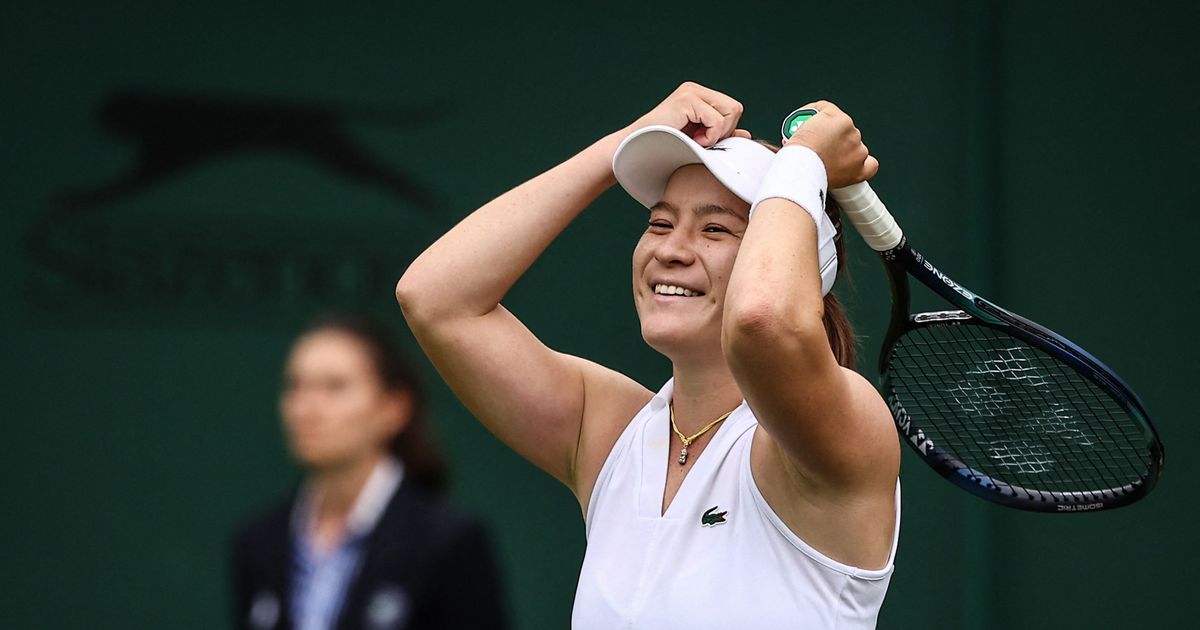
Note — This interview was published following Lulu Sun’s first-round upset of No.8 seed Zheng Qinwen at Wimbledon.
On Friday, following a two-hour weather delay, Sun shone after the rain to defeat Zhu Lin 7-6(4), 7-6(6) in the third round. As a result, she became the first woman representing New Zealand to reach the fourth round of Wimbledon in the Open Era, and first since Ruia Morrison in 1959. Sun is also the first woman representing New Zealand to reach the fourth round of any major since Belinda Cordwell made the 1989 Australian Open semifinals.
On Sunday, Sun defeated Emma Raducanu 6-2, 5-7, 6-2 to become the first woman representing New Zealand to make the Wimbledon quarterfinals.
Get to know more about Sun’s journey below.
Her moment in the Sun ☀️
Lulu Sun makes history as the first New Zealand player in history to reach the ladies’ singles fourth round at Wimbledon 🇳🇿 ♥️#Wimbledon pic.twitter.com/iemCHfSHD0
— Wimbledon (@Wimbledon) July 5, 2024
WIMBLEDON — The first upset of a Top 10 player at Wimbledon was dealt out by No.123-ranked qualifier Lulu Sun, who took out No.8 seed Zheng Qinwen 4-6, 6-2, 6-4. The result marked a number of personal and national milestones for the 23-year-old, who switched nationalities from Switzerland to New Zealand earlier this year.
Wimbledon 2024: Scores | Draws | Order of play
- It was not only Sun’s first Top 10 win, but her first completed victory over any player in the Top 100.
- Having qualified for her first Grand Slam main draw at this year’s Australian Open, falling to Elisabetta Cocciaretto in the first round, it was Sun’s first win in a major.
- It was the first Grand Slam main draw win by a woman representing New Zealand since Marina Erakovic made the third round of Wimbledon 2016, and the first win over a Top 10 player by a New Zealander since Erakovic beat Victoria Azarenka at Stanford 2011.
Get to know more about Sun here.
Sun is the product of an international background
Sun was born in New Zealand to a Chinese mother and Croatian father, and was raised in Switzerland from the age of 5. She was a college tennis standout at the University of Texas, and now divides her time between Florida and Slovakia (the home country of her coach, Vladimir Platenik). She speaks three languages fluently — English, French and Chinese.
“I think I’m lucky to have all these backgrounds behind me,” she said. “From an early age I got to see the world and get to know it through my family.
“When you have so many cultures behind you, you don’t really 100% fit into one. Sometimes when I was growing up, it was really hard to fit into one specific culture. But now I’ve grabbed different parts of different cultures and they somehow became me. I’m not fighting it, I’m not trying to be a specific culture.”
Sun says that her experience playing in Auckland this January, and particularly feeling the love she received from the crowd, was a key factor in her decision to officially switch nationality.
Sun is a politically aware international relations graduate
Appropriately, Sun majored in international relations and global studies.
“Everyone says it’s befitting,” she said after her final qualifying win last week. “I picked it because it’s a very interesting subject. A lot of student athletes pick kinesiology or something to do with sports.
“A lot of people say sports is not politics, which is true. Sports is sports. But if you look into world affairs and other cultures, you get to see how they view the world and their perspective. You get to see how other people live and think. You open your mind to the whole world.”
Sun is aware that she is playing Wimbledon at an unusually fraught political moment. For the first time, a British general election will occur during the tournament, on the first Thursday; simultaneously over the first week, the two rounds of the French election take place. Sun is a keen proponent of citizens doing their democratic duty.
“It is an important thing to vote,” she said. “The majority of people don’t vote. I read about your Brexit and how a lot of people didn’t vote because they didn’t think they could affect it, or that it didn’t matter. So I think it’s important for people to realise how majorly they can affect the system.”
Injury sent Sun down the college route
Back in 2015, just after she turned 14, Sun became the first player born in 2001 to gain a WTA ranking — before her peers Iga Swiatek, Amanda Anisimova and Anastasia Potapova.
“I went to Sharm el Sheikh in Egypt and kept winning the first rounds,” she recalled. “Fair enough, I’ll take that!”
Nonetheless, at that point, Sun still saw tennis as fun rather than a potential career. That had started to change by the time her junior career came to a close — but her mother, Lele, had other ideas.
“After I experienced all the junior Grand Slams I thought I was able to do this, I have a good level and I want to try it out,” said Sun. “But my mum said education is important, and she was concerned about how I was going to do my studies if I continued. That year I was injured, and she said I might as well do my exams and get into college, so that’s what I did.
“It was great timing, because then Covid happened. I was able to do my studies at a time when nothing else was happening. I heard from a lot of other players about how the tournaments were [when they came back] and they sounded really not great experiences. So I was lucky to be able to choose.”
Sun learned from her Australian Open experience to beat Zheng
In her first Grand Slam main draw match, Sun was disappointed with her 6-1, 7-5 loss to Cocciaretto. This time round, she vowed not to think about her opponent as a big name. Nor did she think about the only time she’d faced Zheng before — a 6-2, 6-0 loss in juniors at the 2018 Eddie Herr.
“I didn’t really view her ranking coming in, because I’ve done that before in the past and it didn’t work out well,” she said. “I just played the match as it was, the ball as it was, and her weaknesses as they were. I remember in juniors I was like, ‘Damn, she really destroyed me.’ Being able to come back and win in three sets proves how much I’ve improved through the years.”
Sun feels her game is a natural fit for grass
In the final round of qualifying against Alexandra Eala, Platenik’s primary piece of advice from the sidelines was: “Use your variety.” That also came to the fore against Zheng in the main draw. Sun’s biting slice repeatedly outfoxed the Australian Open finalist, and she won seven out of nine points at net.
“It can disrupt anyone, to be honest,” she said afterwards. “The slice on the serve, as well as the groundstrokes, definitely has its advantages on grass.”
Sun says she felt comfortable on the surface the first time she played on it, even if her junior results didn’t necessarily show it.
“I didn’t win a lot of matches, but I enjoyed the experience,” she said.
Sun is riding the wave from winning a wild qualifying match
In the second round of qualifying, Sun led Gabriela Knutson 5-1 in the third set — only to lose five straight games, and find herself staring down a match point.
She saved that, and edged the Czech 4-6, 6-4, 7-6[6] in a super-tiebreak. Since then, she feels she’s been at her best in tight moments.
“It’s what tennis is about,” she said. “The special thing about tennis is that in any moment, in any situation, you can come back, as long as you fight and work through each point. That competitiveness, even when you think it’s the end, is what I love about tennis. Even when you think it’s over, it’s not.”
Source: https://www.wtatennis.com/news/4048332/sun-becomes-first-new-zealander-in-wimbledon-quarters-in-open-era


